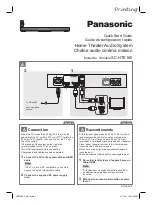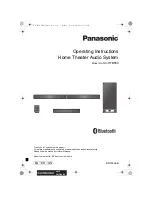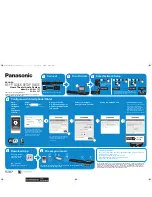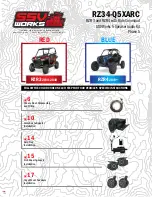
Installation: Existing Construction
(retrofitting finished walls)
Warning: Exercise caution when drilling into existing walls. Do
not drill through existing wires, pipes, conduits, heating or air
conditioning ducts. If you feel resistance while drilling, stop
immediately.
1.
Using a studfinder or the "knocking" method, locate the wall
studs in the wall area where you wish to mount the speaker. The
speaker will be mounted between adjacent studs (fig.8).
2.
Determine that there are no obstructions behind the desired
cutout area. This may be accomplished by drilling a hole in the
center of the cutout area and using an "L"-shaped piece of metal
(like a coat hanger) to "feel around" behind the wall. If you
discover an obstruction, fill the hole with patching compound and
try another location.
3.
If there are no obstructions found behind the wall, use the
supplied cutout template and a pencil to draw a
13 9/16" x 9"
outline of the area to be cut out. Use a level to ensure that the
cutout is precisely positioned. Begin by drilling the four corners with
a ¼" bit (fig.8). Then cut out the wall section with a utility knife or
keyhole saw, following the lines traced around the mounting
template. If the wall is painted or wallpapered, use the keyhole saw.
4.
If the wall is constructed of lath and plaster, outline the penciled
marks with masking tape, drill the four corners with a 1/4" drill bit,
and use a utility knife to cut through the plaster down to the lath.
Use a saber saw with a metal cutting blade or a pair of tin snips to
gently cut through the lath, being careful not to vibrate plaster off
the wall.
5.
NHT offers iWF foam blocks to optimize the performance if your
iW4. See the web site for more information:
nhthifi.com
Refer to
the diagram (fig. 9) for orientation of the foam blocks. Insert one of
the 4" x 4" x 8" foam blocks vertically through the speaker cutout.
Push this block down below the edge of the cutout. Insert the sec-
ond 4" x 4" x 8" foam block and push up above the top edge of the
speaker cutout. Bend one of the 4" x 4" x 16" foam blocks into a U
shape and push down into the wall horizontally so that it is below
the speaker cutout. Make sure that there is a good seal with the
edge of the foam and both the left and right wall studs. Repeat for
the upper 4" x 4" x 16" foam block. The foam should also make a
good seal around the speaker wires.
2 - 3 inches
4 - 5 inches
Cutout
Horizontal
Cutout
Vertical
Foam
Foam
S
tud
S
tud
S
tud
S
tud
Foam
Foam
Foam
Foam
Foam
Foam
fig.9
Cutout
Horizontal
Cutout
Vertical
S
tud
S
tud
S
tud
S
tud
Drill
Drill
Cut
Cut
fig.8
Summary of Contents for Architect iW4
Page 11: ... a n c Dl 0 ft c 0 o ...
































